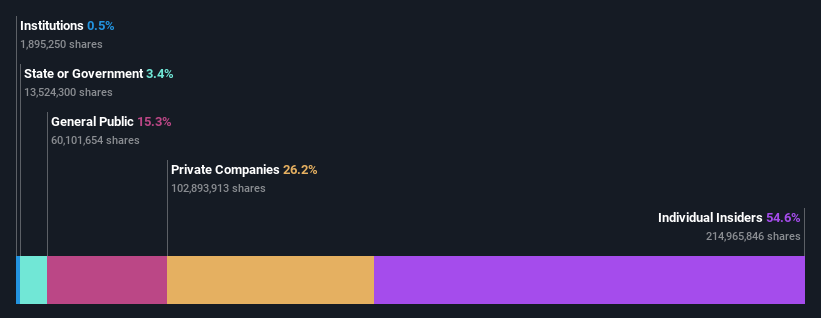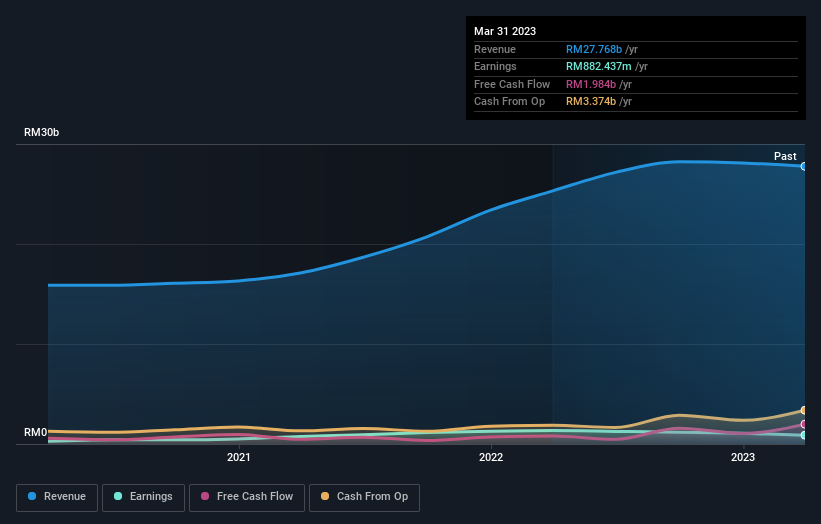The recent RM315m market cap decrease is likely to have disappointed insiders invested in Batu Kawan Berhad (KLSE:BKAWAN)

Key Insights
- Significant insider control over Batu Kawan Berhad implies vested interests in company growth
- The top 3 shareholders own 55% of the company
- Using data from company's past performance alongside ownership research, one can better assess the future performance of a company
To get a sense of who is truly in control of Batu Kawan Berhad (KLSE:BKAWAN), it is important to understand the ownership structure of the business. And the group that holds the biggest piece of the pie are individual insiders with 55% ownership. Put another way, the group faces the maximum upside potential (or downside risk).
As a result, insiders as a group endured the highest losses after market cap fell by RM315m.
Let's delve deeper into each type of owner of Batu Kawan Berhad, beginning with the chart below.
Check out our latest analysis for Batu Kawan Berhad

What Does The Lack Of Institutional Ownership Tell Us About Batu Kawan Berhad?
Small companies that are not very actively traded often lack institutional investors, but it's less common to see large companies without them.
There are multiple explanations for why institutions don't own a stock. The most common is that the company is too small relative to funds under management, so the institution does not bother to look closely at the company. On the other hand, it's always possible that professional investors are avoiding a company because they don't think it's the best place for their money. Institutional investors may not find the historic growth of the business impressive, or there might be other factors at play. You can see the past revenue performance of Batu Kawan Berhad, for yourself, below.

Batu Kawan Berhad is not owned by hedge funds. Looking at our data, we can see that the largest shareholder is Seri Oi Hian Lee with 44% of shares outstanding. For context, the second largest shareholder holds about 5.9% of the shares outstanding, followed by an ownership of 5.7% by the third-largest shareholder. Eng Yeoh, who is the third-largest shareholder, also happens to hold the title of Member of the Board of Directors.
After doing some more digging, we found that the top 3 shareholders collectively control more than half of the company's shares, implying that they have considerable power to influence the company's decisions.
While it makes sense to study institutional ownership data for a company, it also makes sense to study analyst sentiments to know which way the wind is blowing. Our information suggests that there isn't any analyst coverage of the stock, so it is probably little known.
Insider Ownership Of Batu Kawan Berhad
The definition of company insiders can be subjective and does vary between jurisdictions. Our data reflects individual insiders, capturing board members at the very least. Management ultimately answers to the board. However, it is not uncommon for managers to be executive board members, especially if they are a founder or the CEO.
Most consider insider ownership a positive because it can indicate the board is well aligned with other shareholders. However, on some occasions too much power is concentrated within this group.
It seems that insiders own more than half the Batu Kawan Berhad stock. This gives them a lot of power. That means insiders have a very meaningful RM4.5b stake in this RM8.3b business. Most would argue this is a positive, showing strong alignment with shareholders. You can click here to see if they have been selling down their stake.
General Public Ownership
The general public-- including retail investors -- own 15% stake in the company, and hence can't easily be ignored. While this size of ownership may not be enough to sway a policy decision in their favour, they can still make a collective impact on company policies.
Private Company Ownership
We can see that Private Companies own 26%, of the shares on issue. It might be worth looking deeper into this. If related parties, such as insiders, have an interest in one of these private companies, that should be disclosed in the annual report. Private companies may also have a strategic interest in the company.
Next Steps:
I find it very interesting to look at who exactly owns a company. But to truly gain insight, we need to consider other information, too. Consider for instance, the ever-present spectre of investment risk. We've identified 3 warning signs with Batu Kawan Berhad , and understanding them should be part of your investment process.
If you would prefer check out another company -- one with potentially superior financials -- then do not miss this free list of interesting companies, backed by strong financial data.
NB: Figures in this article are calculated using data from the last twelve months, which refer to the 12-month period ending on the last date of the month the financial statement is dated. This may not be consistent with full year annual report figures.
If you're looking to trade Batu Kawan Berhad, open an account with the lowest-cost platform trusted by professionals, Interactive Brokers.
With clients in over 200 countries and territories, and access to 160 markets, IBKR lets you trade stocks, options, futures, forex, bonds and funds from a single integrated account.
Enjoy no hidden fees, no account minimums, and FX conversion rates as low as 0.03%, far better than what most brokers offer.
Sponsored ContentValuation is complex, but we're here to simplify it.
Discover if Batu Kawan Berhad might be undervalued or overvalued with our detailed analysis, featuring fair value estimates, potential risks, dividends, insider trades, and its financial condition.
Access Free AnalysisHave feedback on this article? Concerned about the content? Get in touch with us directly. Alternatively, email editorial-team (at) simplywallst.com.
This article by Simply Wall St is general in nature. We provide commentary based on historical data and analyst forecasts only using an unbiased methodology and our articles are not intended to be financial advice. It does not constitute a recommendation to buy or sell any stock, and does not take account of your objectives, or your financial situation. We aim to bring you long-term focused analysis driven by fundamental data. Note that our analysis may not factor in the latest price-sensitive company announcements or qualitative material. Simply Wall St has no position in any stocks mentioned.
About KLSE:BKAWAN
Batu Kawan Berhad
An investment holding company, cultivates and processes palm and rubber products in Malaysia, the Far East, the Middle East, South East Asia, Southern Asia, Europe, North and South America, Australia, Africa, and internationally.
Mediocre balance sheet second-rate dividend payer.
Similar Companies
Market Insights
Community Narratives



